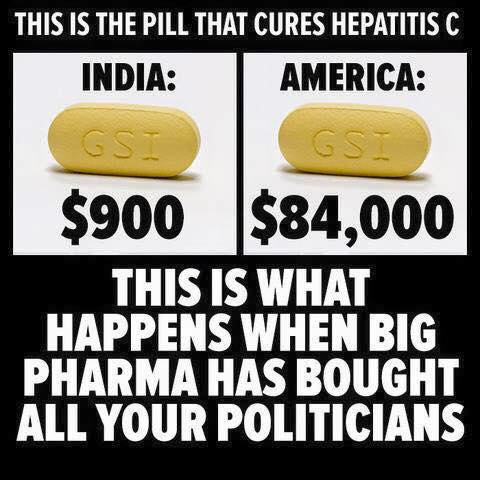By Kritika Dagar
The Intellectual Property Rights (IPR) grant exclusive rights to Patents, Copyrights, Trademarks, Geographical Indicators etc. to promote innovation.
Compared with several developed countries our IPRs are ‘weak’ as they do not comply with stringent US regulations. India, along with China, Russia and 8 other countries, is therefore, on priority watch list of US’ Special 301 report.
Earlier this February, the US Chamber of Commerce came out with a report that ranked India 43rd out of 45 countries in Intellectual property friendliness. In fact India has continued to languish at the bottom of the list ever since this exercise was started by the US. The people behind these reports are rich business lobby groups, led by PhRMA –the U.S. pharmaceutical lobby, looking to increase their profit margins at the expense of poor people.
The Situation Earlier
Before India joined WTO, Indian Patent law did not allow a product to be patented, only the process could be patented in case of food, drugs and other chemical substances. This was deliberately done by Indian lawmakers to protect public health as majority of patents were held by western companies who would have kept the prices high.
In those days reverse engineering to create the same drugs that western MNCs held patents to were common. Cipla was one such company, it provided generic AIDS and other drugs to the developing world at fraction of the cost thus making its use viable in poor countries. USA was meanwhile campaigning to stop India from exporting the AIDS drugs to Africa and other developing nations at a cheaper cost, a move which drew flak from the public and media.
After Joining WTO
After becoming a WTO member, Indian Patent Act was amended in 2005, to comply with TRIPS agreement which sets the minimum standard of IPR. Most notably patents for drugs were allowed with a few safeguards in place for public health in developing countries, as allowed in the agreement.
India’s IPR regime is now compliant with the Trade Related Aspects of Intellectual Property rights (TRIPS) agreement of World Trade Organisation; but the pressure from developed countries to align the IPR to the standards of developed countries is imminent.
The PhRMA (U.S. pharmaceutical lobby) and western countries still make hue and cry of the following provisios of Indian Patent Act:
- Section 3(d): mentions that patents would not be granted in case of only incremental changes in an existing patent.
This prevents pharmaceutical companies from ‘evergreening’ their patents i.e. extending the life of an already patented drug with a minor tinkering in its chemical composition. This is how pharma companies retain monopoly of a drug and keep its price high.
In the landmark judgement of Novartis v. Union of India – a victory of public health, Supreme Court ruled that Novartis, a Swiss pharmaceutical giant cannot patent Glivec as the drug did not exhibit enhanced efficacy compared with a pre-existing drug.
While India is one of the few countries with a law against evergreening, in US the problem is prevalent as patents are granted even for ‘new and useful improvements’ to already patented inventions.
- Compulsory licensing (CL) allows the government to grant manufacturing rights of a patented drug to a third party if its prices are unaffordable or in case of non-availability of drug in India.
This helps in reducing the prices of life saving drugs and increasing the availability. Under the Doha Declaration on the TRIPS Agreement Public Health, each WTO member has the right to grant CLs and the freedom to determine the grounds upon which they are granted.
While US has less number of stated conditions to grant CLs, it is ironical that US government backed by PhRMA is trying to stop India from issuing CLs when it leads the world in issuing them.
- Software patents are not allowed in India without an accompanying computer related invention/hardware.
This too has drawn the ire of Western Software companies. Software Patents are very complex as they are not really inventions but the amount of time and money spent on lawsuits is huge, benefitting only major players. This is demonstrated by the sheer number of disputes the US courts receive regarding software patents.
Gary Becker, a Nobel Prize winning economist has said that “Disputes over software patents are among the most common, expensive, and counterproductive. Their exclusion from the patent system would discourage some software innovations, but the saving from litigation costs over disputed patent rights would more than compensate the economy for that cost.” Indian judicial system is far from coping with it.
Indian or International?
In 2015 Martin Shkreli was dubbed America’s most hated man for raising an AIDS drug’s price by over 5000% after acquiring its rights. He maybe a scapegoat but is not the lone pharma boss in trying to make huge money off diseased people.
When America cannot afford American drugs, how can India- with largest number of people below poverty line? Moreover, India still lacks basic healthcare insurance. Aligning India’s IPR to that of the developed world would be a disaster especially for public health. In this view the ongoing backlash of India’s IPR by the USA is not justified.

India’s IPR is balanced in promoting welfare of its citizens and industrial innovation, especially since 2005 amendment.
References from Livemint, Reuters, ET, PC World and Washington Post.
http://edtimes.in/2016/02/pharmaceuticals-industrys-martin-shkreli/

































